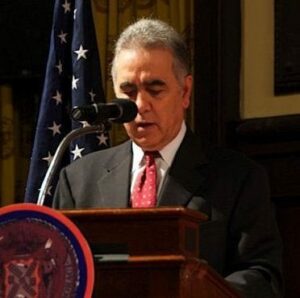,
As relations between Israel and Turkey have become increasinly strained in recent years, shifting from strategic alliance to outright hostility, many analysts began to wonder about the Israeli government’s uncharacteristically muted reaction to Turkish Pres. Erdogan’s anti-Semitic diatribes and anti-Israeli actions.
Under these circumstances, Armenians and their supporters are puzzled by Prime Minister Benjamin Netanyahu’s continued complicity in the Turkish government’s denial of the Armenian Genocide and the blocking of its recognition by the Knesset (parliament).
Some Middle East experts offer two explanations of Israel’s puzzling stance:
1) Despite the apparent bad blood between Israel and Turkey, the two countries continue their covert intelligence sharing and arms trade.
2) Azerbaijan, Turkey’s junior brother, has taken an aggressive role in pressuring Israel not to recognize the Armenian Genocide by using as leverage its purchase of billions of dollars of advanced Israeli weapons, providing Israel much needed petroleum products, and a base in Baku to infiltrate and spy on Iran with which it has a 400-mile border.
The Israeli government has become so overly sensitive to Azerbaijan’s diktats that during a recent visit by Armenia’s Foreign Minister Edward Nalbandian to Jerusalem, Israel’s Foreign Minister rudely refused to meet with him. Only through a last minute intervention, Mr. Nalbandian managed to meet with the President of Israel.
An article in the November 1 issue of The Jerusalem Post fully illustrates the extent of Israel’s kowtowing to Azerbaijan. At a time when most Western groups, including the Organization for Security and Cooperation in Europe (OSCE), refused to monitor Azerbaijan’s Parliamentary elections because of restrictions imposed by Baku, four Israeli Knesset members rushed to Azerbaijan to show their support for Aliyev’s despotic regime!
The Israeli delegation, led by former Foreign Minister Avigdor Lieberman, now chairman of the Israel-Azerbaijan Parliamentary Group, included ex-ambassador to the U.S. Michael Oren, Sofa Landver, and Yoel Razbozov.
The Jerusalem Post reported that Lieberman, as Foreign Minister, “worked to strengthen Israeli ties with Azerbaijan,” and quoted him saying in Baku that it is “an important country and a good friend of Israel…. Even in the time of the Soviet Union, [Azerbaijan] was known to treat its Jewish community well, and there is no anti-Semitism there. We must continue strengthening our relations with Azerbaijan.” Azernews also quoted him telling the Azeri Elections Media Center that Azerbaijan “is an example of democracy, stability, and successful foreign policy.” Most knowledgeable people would dismiss such ridiculous and false statements.
One wonders why the former Foreign Minister is so anxious to whitewash Azerbaijan’s past and present practices of anti-Semitism? After the four Knesset members return from Baku, they should be asked to disclose the lavish gifts they must have received in appreciation for their rubber stamping of the fraudulent elections in Azerbaijan. Not surprisingly, Aliyev maintained its tight grip on power after his ruling party retained its majority in parliament, while the mainstream opposition boycotted last Sunday’s elections.
The Jerusalem Post reported that “Azerbaijan is considered the Muslim country friendliest to Israel, and the two countries have close ties and significant trade. Azerbaijan is Israel’s biggest oil provider, and trade between the two countries reaches $5 billion, more than with France. In recent years, Lieberman, then-president Shimon Peres, and Defense Minister Moshe Ya’alon visited Baku.”
In pursuing its arms for oil policy, Israeli officials have conveniently ignored Azerbaijan’s gross violations of human rights, lack of freedom of speech, and jailing of journalists and activists, including Leyla Yunus, head of the Baku-based Institute for Peace and Democracy, and investigative reporter Khadija Ismayilova of Radio Free Europe.
While it might be somewhat understandable that Israel and Azerbaijan are pursuing their self-interests, no matter how reprehensible the means, Armenia must also pursue its own national interests and counter the actions of any country that jeopardizes its security and questions the Genocide. The Armenian government should make crystal clear to Israeli officials that by selling multi-billion dollar sophisticated weapons to Azerbaijan, they become responsible for putting at risk thousands of Armenian lives. Azerbaijani officials have publicly announced that they intend to use the arms acquired from Israel to attack Nagorno Karabagh (Artsakh) and Armenia.
Lastly, Armenia should warn Azerbaijan that its unwarranted denials of the Armenian Genocide and pressures on other countries, such as Israel, to join its denialist cause, would further antagonize Armenians, making it impossible for them to accept any concessions on the Artsakh conflict.


